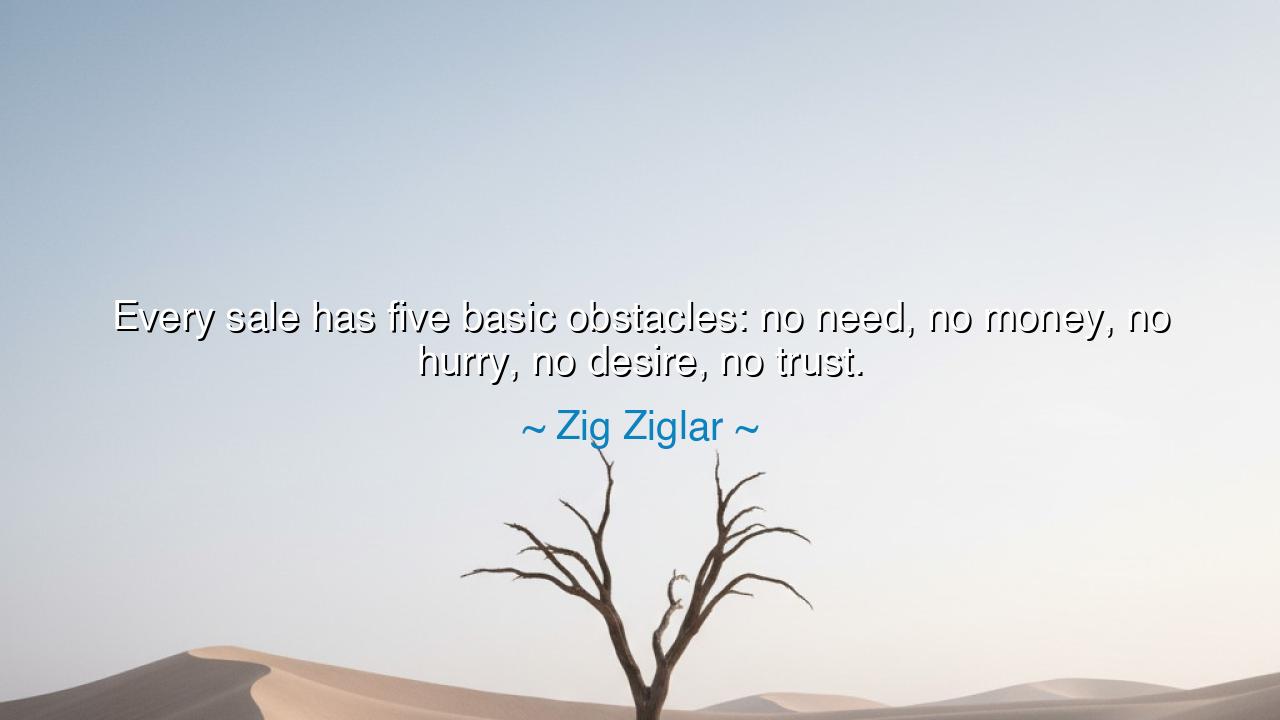
Every sale has five basic obstacles: no need, no money, no






The words of Zig Ziglar—“Every sale has five basic obstacles: no need, no money, no hurry, no desire, no trust”—speak with the clarity of a seasoned sage who has walked through the valleys of rejection and climbed the mountains of persuasion. Though the language is of commerce, the wisdom is of life itself, for these five barriers are not merely challenges of trade, but reflections of the human heart. To overcome them is not only to make a sale, but to learn how to speak to men’s true concerns, their fears, and their hidden longings.
The origin of this quote lies in the world of salesmanship, where Zig Ziglar, one of the most renowned teachers of motivation and persuasion, sought to reveal the timeless truths behind human decision-making. He understood that selling is not trickery nor coercion, but the art of service—of helping another see value where doubt resides. Thus he distilled the obstacles that most often prevent agreement into these five elemental forces: need, money, hurry, desire, and trust. To master these is to master not only the craft of selling, but the greater art of influence in all human dealings.
Consider each obstacle as a stone on the path. The first, no need, reflects the blindness of men who cannot see how a thing may serve them. The wise seller must first open the eyes of the other, showing how the offering meets their deeper necessity. The second stone, no money, represents the harsh reality of means. Here, the skill lies not in forcing, but in showing value greater than cost, or in finding paths of sacrifice that make the purchase worthy. The third, no hurry, is the slumber of delay, the eternal “tomorrow” that kills many noble endeavors. To awaken urgency is to rouse the spirit to act before opportunity fades.
The fourth stone, no desire, lies at the heart of motivation. A man may see the need, have the means, and feel no urgency, yet without desire he remains unmoved. Thus the seller must paint pictures of possibility, stir the imagination, and show what life could be with the offering embraced. And finally comes the greatest stone of all—no trust. Without trust, no bridge can be crossed, no relationship built. Even the greatest product, at the fairest price, with clear need and burning urgency, will fail if trust is absent. For trust is the foundation of all human exchange.
History itself illustrates this truth. When Thomas Edison sought to bring the light bulb to the world, he faced all five obstacles. Many believed they had no need, for gas lamps already served them. Others said they had no money, for the new technology seemed costly. Still others saw no hurry, content to wait for others to adopt it first. Desire was weak, for few imagined how light could transform cities and homes. And above all, there was little trust—some thought the invention dangerous, untested, even foolish. Yet Edison persisted, demonstrating the value, lowering the costs, creating urgency, kindling desire, and proving himself trustworthy through patience and results. In the end, he did not simply make a sale; he altered the destiny of the world.
The lesson for us is clear: whether in sales, in leadership, or in daily life, we must learn to understand and remove the barriers that keep others from moving forward. We must not see rejection as defeat, but as revelation—each “no” reveals which of the five stones still blocks the path. The wise do not curse the stones, but patiently work to remove them, one by one, until the way is clear.
Practically, let us take this wisdom into our own lives. When you offer something—a service, a product, an idea, or even your friendship—ask yourself: Have I shown the need? Have I justified the money? Have I awakened the hurry? Have I stirred the desire? Above all, have I earned the trust? If you can answer these with strength, then the obstacles will fall like walls before a steady hammer, and your influence will grow not through force, but through service and truth.
Thus Ziglar’s words stand not as mere counsel for salesmen, but as a map for all who would persuade, inspire, and lead. Remember always: “Every sale has five basic obstacles: no need, no money, no hurry, no desire, no trust.” To overcome them is to win not only transactions, but the hearts of men. And those who master this art shall leave a legacy not of fleeting wealth, but of lasting impact.






AAdministratorAdministrator
Welcome, honored guests. Please leave a comment, we will respond soon